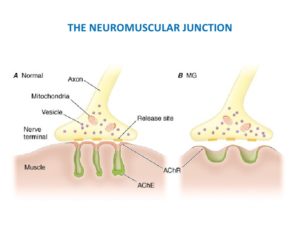Causes of Myasthenia Gravis:
1 – Antibodies
Your nerves communicate with your muscles by releasing chemicals (neurotransmitters) that fit precisely into receptor sites on the muscle cells at the nerve-muscular junction.
In myasthenia gravis, your immune system produces antibodies that block or destroy many of your muscles’ receptor sites for a neurotransmitter called acetylcholine (as-uh-teel-KOH-leen). With fewer receptor sites available, your muscles receive fewer nerve signals, resulting in weakness.
Antibodies can also block the function of a protein called a muscle-specific receptor tyrosine kinase (TIE-roh-seen KIE-nays). This protein is involved in forming the nerve-muscular junction. Antibodies that block this protein can lead to myasthenia gravis.
2- Thymus Gland
The thymus gland is a part of your immune system situated in the upper chest beneath your breastbone. Researchers believe the thymus gland triggers or maintains the production of the antibodies that block acetylcholine.
Large in infancy, the thymus gland is small in healthy adults. In some adults with myasthenia gravis, however, the thymus gland is abnormally large. Some people with myasthenia gravis also have tumors of the thymus gland (thymomas). Usually, thymomas aren’t cancerous (malignant), but they can become cancerous.
3 – Other Causes:
Some people have myasthenia gravis that isn’t caused by antibodies blocking acetylcholine or the muscle-specific receptor tyrosine kinase. This type of myasthenia gravis is called antibody-negative myasthenia gravis. Antibodies against another protein, called lipoprotein-related protein 4, can play a part in the development of this condition.
Rarely, mothers with myasthenia gravis have children who are born with myasthenia gravis (neonatal myasthenia gravis). If treated promptly, children generally recover within two months after birth.
Some children are born with a rare, hereditary form of myasthenia, called congenital myasthenic syndrome.
Factors that can worsen Myasthenia Gravis:
- Fatigue
- Illness
- Stress
- Some medications — such as beta blockers, quinidine gluconate, quinidine sulfate, quinine, phenytoin, certain anesthetics and some antibiotics
- Pregnancy
- Menstrual periods
Complications of Myasthenia Gravis:
Complications of myasthenia gravis are treatable, but some can be life-threatening.
Myasthenic crisis
Myasthenic crisis is a life-threatening condition that occurs when the muscles that control breathing become too weak to do their jobs. Emergency treatment is needed to provide mechanical assistance with breathing. Medications and blood-filtering therapies help people to again breathe on their own.
Thymus gland tumors
Some people with myasthenia gravis have a tumor in their thymus gland, a gland under the breastbone that is involved with the immune system. Most of these tumors, called thymomas, aren’t cancerous (malignant).
Other disorders
People with myasthenia gravis are more likely to have the following conditions:
- Underactive or overactive thyroid. The thyroid gland, which is in the neck, secretes hormones that regulate your metabolism. If your thyroid is underactive, you might have difficulties dealing with cold, weight gain and other issues. An overactive thyroid can cause difficulties dealing with heat, weight loss and other issues.
- Autoimmune conditions. People with myasthenia gravis might be more likely to have autoimmune conditions, such as rheumatoid arthritis or lupus.

